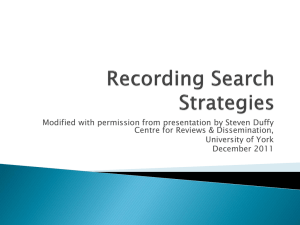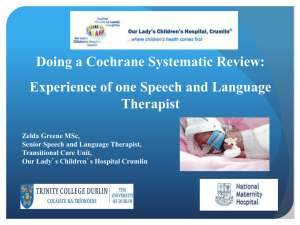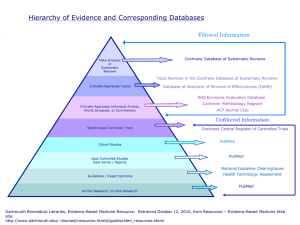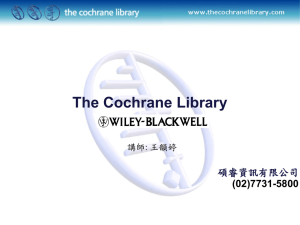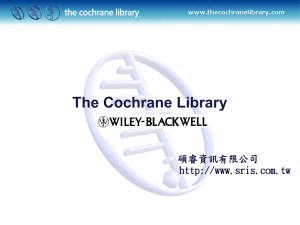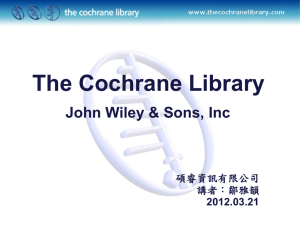Consumers and the CSG
advertisement
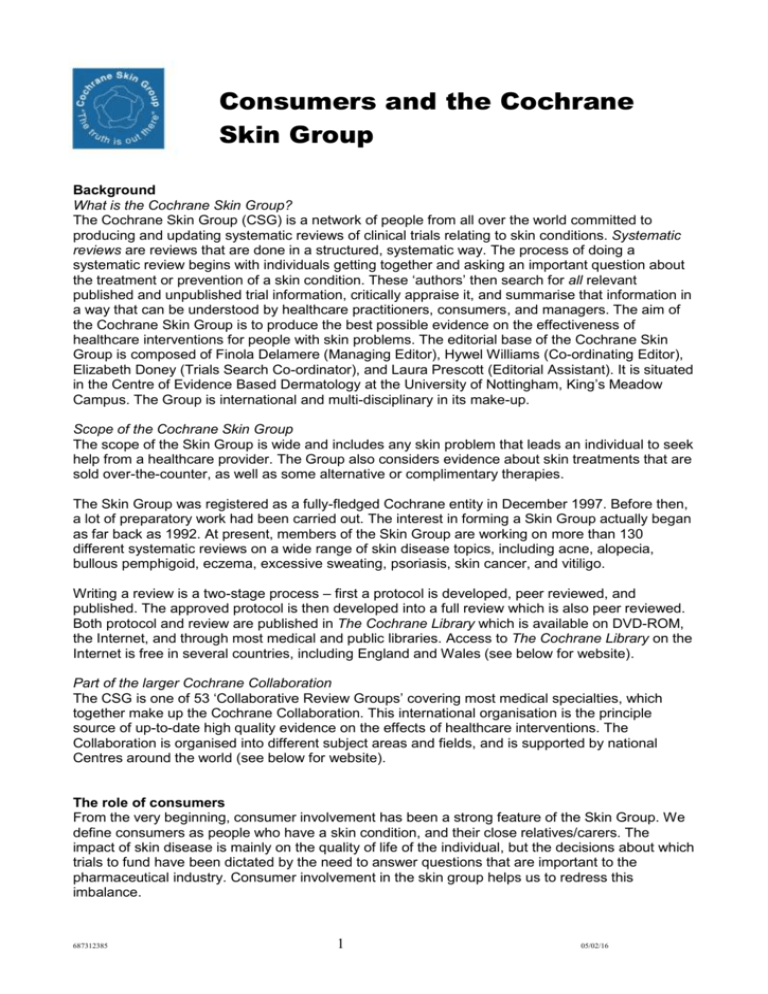
Consumers and the Cochrane Skin Group Background What is the Cochrane Skin Group? The Cochrane Skin Group (CSG) is a network of people from all over the world committed to producing and updating systematic reviews of clinical trials relating to skin conditions. Systematic reviews are reviews that are done in a structured, systematic way. The process of doing a systematic review begins with individuals getting together and asking an important question about the treatment or prevention of a skin condition. These ‘authors’ then search for all relevant published and unpublished trial information, critically appraise it, and summarise that information in a way that can be understood by healthcare practitioners, consumers, and managers. The aim of the Cochrane Skin Group is to produce the best possible evidence on the effectiveness of healthcare interventions for people with skin problems. The editorial base of the Cochrane Skin Group is composed of Finola Delamere (Managing Editor), Hywel Williams (Co-ordinating Editor), Elizabeth Doney (Trials Search Co-ordinator), and Laura Prescott (Editorial Assistant). It is situated in the Centre of Evidence Based Dermatology at the University of Nottingham, King’s Meadow Campus. The Group is international and multi-disciplinary in its make-up. Scope of the Cochrane Skin Group The scope of the Skin Group is wide and includes any skin problem that leads an individual to seek help from a healthcare provider. The Group also considers evidence about skin treatments that are sold over-the-counter, as well as some alternative or complimentary therapies. The Skin Group was registered as a fully-fledged Cochrane entity in December 1997. Before then, a lot of preparatory work had been carried out. The interest in forming a Skin Group actually began as far back as 1992. At present, members of the Skin Group are working on more than 130 different systematic reviews on a wide range of skin disease topics, including acne, alopecia, bullous pemphigoid, eczema, excessive sweating, psoriasis, skin cancer, and vitiligo. Writing a review is a two-stage process – first a protocol is developed, peer reviewed, and published. The approved protocol is then developed into a full review which is also peer reviewed. Both protocol and review are published in The Cochrane Library which is available on DVD-ROM, the Internet, and through most medical and public libraries. Access to The Cochrane Library on the Internet is free in several countries, including England and Wales (see below for website). Part of the larger Cochrane Collaboration The CSG is one of 53 ‘Collaborative Review Groups’ covering most medical specialties, which together make up the Cochrane Collaboration. This international organisation is the principle source of up-to-date high quality evidence on the effects of healthcare interventions. The Collaboration is organised into different subject areas and fields, and is supported by national Centres around the world (see below for website). The role of consumers From the very beginning, consumer involvement has been a strong feature of the Skin Group. We define consumers as people who have a skin condition, and their close relatives/carers. The impact of skin disease is mainly on the quality of life of the individual, but the decisions about which trials to fund have been dictated by the need to answer questions that are important to the pharmaceutical industry. Consumer involvement in the skin group helps us to redress this imbalance. 687312385 1 05/02/16 Currently, the Skin Group has about 30 active consumers who are involved at many levels within the organisation. Most were initially recruited through the National Eczema and Vitiligo Societies. However, since we have decided to always include a relevant consumer as part of the peer review process, more consumers from other countries and other backgrounds have become involved. How do consumers contribute? There are many ways that consumers can help the Cochrane Skin Group. Some of these ways are listed below: Choosing topics for a systematic review Consumers can participate in the initial stage of deciding on a topic and framing the questions to be considered in the review. In this way the topics chosen will be relevant and of interest to patients and families, and not limited to those that are of interest solely to researchers and doctors. Writing protocols and undertaking the systematic review Reviews are produced by a multi-disciplinary team and we try to involve a consumer in each team i.e. as an author, involved primarily with ensuring that the outcomes quoted in the review are relevant and that the review is written in language that makes it accessible and meaningful to nontechnical people. Currently our review on vitiligo is led by a consumer. The Cochrane Collaboration has evolved a standardised method of carrying out an unbiased review, and provides free workshops on how to write a protocol and analyse the data. Refereeing protocols and reviews Consumers can also assist by critically assessing (refereeing) the protocols and reviews before they are submitted for publication. When consumers act as referees to protocols and reviews, they are asked to focus on specific issues and questions. They do not have to comment on the technical content of the review if they do not wish to. An essential role for consumers is to ensure that the outcome measures adopted in a review include those that are important to consumers and that the review is written in a way that is reasonably easy for a lay person to follow. A specially designed consumer referee form with notes and a glossary of terms has been developed to guide consumers through the process of commenting on protocols and reviews. Handsearching Consumers also participate in handsearching the literature. “Handsearching” involves manually searching for reports of clinical trials in dermatology journals because they may have been allocated incorrectly in the electronic trial databases. These incorrectly tagged trials would then be missed by electronic searches were it not for this laborious and rigorous handsearching exercise. Finding all possible trials on a topic and assessing them for inclusion in a systematic review is an important principle of the Collaboration’s work. General administrative tasks The group does have administrative support, but even so, offers of help with tasks ranging from newsletter design are always gratefully received! We welcome and encourage the involvement of consumers in all aspects of the work of the Group. Whilst we can not offer payment for work undertaken we can reimburse expenses incurred, and the published protocols and reviews always acknowledge the help of those involved. The Cochrane Consumer Network (CCNet) and consumer resources CCNet is a consumer organisation that aims to further the role of consumers within The Cochrane Collaboration through supporting consumers working within Cochrane entities, increasing awareness among Cochrane entities of the benefits of working with consumers, and raising issues that are 687312385 2 05/02/16 important to consumers. Membership is free and optional for all consumers working within The Cochrane Collaboration. CCNet has a website (http://consumers.cochrane.org/) with lots of information on consumer participation in the Collaboration and Cochrane reviews. Another useful resource for consumers is the Informed Health Online website, www.informedhealthonline.org, which contains ‘Hot Topics’, Cochrane Review of the Week, a daily "Did you know?" topic, and a new, updated and improved evidence dictionary, amongst other features. There is also a very informative email list for consumers, please visit this website http://lists.cochrane.org/mailman/listinfo/consumers to find out more about the list and details of how to subscribe. Contacting the Cochrane Skin Group The Cochrane Skin Group’s Editorial Base is in Nottingham, UK, with infrastructure support from the NHS Research & Development Programme. For further information about the Cochrane Skin Group and The Cochrane Collaboration, please write to or e-mail Laura Prescott. The contact details of the Editorial Base are as follows: Cochrane Skin Group Managing Editor Dr Finola Delamere Tel: +44 (0)115 8468635 E-mail: finola.delamere@nottingham.ac.uk Centre of Evidence Based Dermatology King’s Meadow Campus, Room A103, University of Nottingham Nottingham, NG7 2NR UK Tel: +44 (0)115 84 68635 Fax: +44(0)115 84 68618 Trials Search Co-ordinator Liz Doney Tel: +44 (0) 115 8468626 E-mail: elizabeth.doney@nottingham.ac.uk Co-ordinating Editor Prof Hywel Williams Tel: +44 (0)115 924 9924 ext 44539 E-mail: hywel.williams@nottingham.ac.uk Editorial Assistant Laura Prescott Tel: +44 (0) 115 8468627 E-mail: csg@nottingham.ac.uk Useful websites Skin Group Cochrane Centres Cochrane Collaboration Reviewers’ Handbook The Cochrane Library Cochrane Consumer Network (CCNet) 687312385 http://skin.cochrane.org/ http://www.cochrane.org/contact/centres http://www.cochrane.org http://www.cochrane-handbook.org http://www.thecochranelibrary.com http://consumers.cochrane.org/ 3 05/02/16
